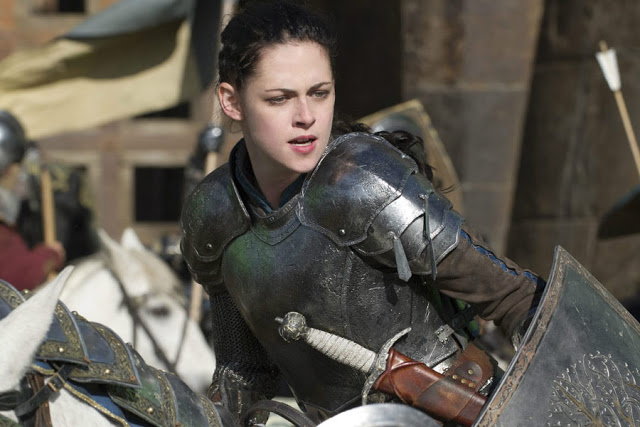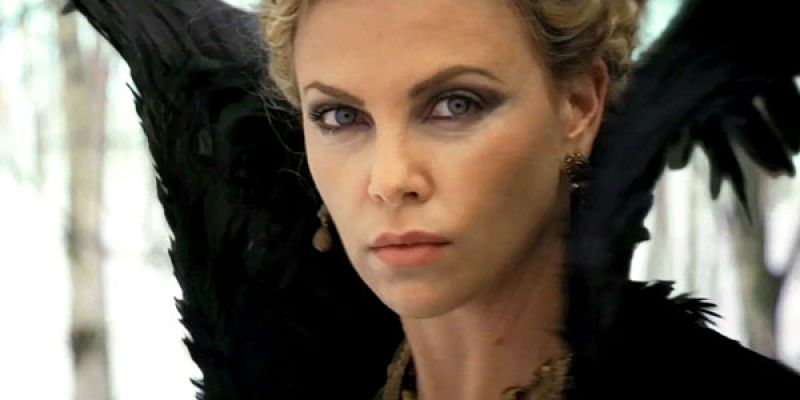Guest post written by Rachel Redfern originally published at Not Another Wave. Cross-posted with permission.
The fairy tale redux is the latest vogue in Hollywood and poor Snow White has been remixed and redone twice in the past year. I didn’t see the Julia Roberts and Nathan Lane adaptation, about which I heard unpleasant things (I wonder though, can anything with the brilliant Nathan Lane ever be that bad?), but the trailer looked promising, despite the presence of Kristin Stewart.
I’m going to go off on a tangent here about Kristin Stewart: really, Hollywood? You like Kristen Stewart that much that you’ve decided to continue to feed her roles? Can’t you just admit that she’s a horrifically, terrible actress? She has literally one expression she uses: surprised fear. I have stuffed animals with a greater range of displayed emotion.
That tepid, surprised fear bleeds its unfortunate paralysis into the rest of the film, which had an otherwise legitimately promising cast and a script with some real potential. The film, and most notably Stewart, fails to commit to anything. Is Snow White a herald of action hero bad-assery intent on her destiny to kill the wicked witch? Or is she an angelic innocent saint, so pure that her goodness can overcome the queen’s toxic, kingdom-killing evil? Stewart definitely has no idea and so neither do the characters who interact with her, making her role (the title one) the most boring and confusing part of the film.
This leads into one of my main feminist concerns with the film, the fact that Stewart’s Snow White is supposedly only powerful because of her “innocence and purity.” Again we have to go back to ideas of innocence and purity for women, without which, we can apparently accomplish nothing, nor be of any value. This is, of course, in direct opposition to the male characters in the film who are drunk, unethical and constantly killing something. This kind of clichéd, stereotype reinforcing portrayal of the wounded, nasty, albeit powerful warrior, who falls in love with the gentle, sweet maiden (always pure), is without a doubt the most annoying thing ever.
In a supposedly “enlightened” society, why do we insist upon returning to Victorian ideals of female purity and a demeaning “innocence” (meaning lacking in life experience and child-like)? I am neither pure nor innocent, yet I manage to hold my own in life and (hopefully) do some good.
However, that doesn’t mean that the film is wholly without any redeeming qualities; the film has a strong focus on the evil queen and gives her a powerful back-story, one that explains her obsession with youth and beauty. The reason she’s so obsessed with beauty? It has been her only means of gaining power and protecting herself from men. This plotline made a great parallel to our own rich and famous and their fascination with cosmetic surgery: in order to stay powerful and current, they must stay young and beautiful or be eviscerated by the media and potentially lose their jobs.
The plotline can be taken even further though. Not only is she conscripted into a life of damaging narcissism because of her beauty, but other women are similarly used. Recognizing that their beauty is both their power and their undoing, we meet a commune of women who have scarred their faces in order to protect themselves from the queen, a plot line that reminded me of the current situation in the Middle East where rules governing women and their clothing have reached new heights. There, some people believe that women should hide their tempting eyes as a way to save men from being forced to ravish them in the streets.
Instead of exploring that plotline further however, the filmmakers decided to move on to another nonsense scene of Stewart looking scared and confused while running through a field.
However, the costume design was amazing, the sets inspiring, the music beautiful (I can say with absolutely certainty that the new Florence and the Machine song, “Breath of Life,” which was created for the film, is awesome), and the cinematography inspiring.
Charlize Theron did a good job as the tortured queen and Sam Spruell as her creepy brother was excellent; their relationship was one of the best parts of the film in my mind. Chris Hemsworth was fairly bland, but nice to look at, so I personally forgive him for being a bit boring.
All in all, the film was a gold mine of good-filmmaking and feminist potential, but which came up short because of it’s inability to either fully embrace its traditional fairy tale values or its modern ones.
Rachel Redfern has an MA in English literature, where she conducted research on modern American literature and film and it’s intersection, however she spends most of her time watching HBO shows, traveling, and blogging and reading about feminism.




I’m very uncomfortable with the level of Kristen Stewart snark coming from a lot of allegedly feminist writers. How are the insults helpful? Also, has the writer watched her strong lead performances in indie, female-directed fare like Speak and The Cake Eaters.
Second, I feel like some of the more negative feminist analysis of SWatH relies on pretty broad stretching to make it work. You write that Snow White’s power comes from her innocence and purity, but that’s certainly not a point that seemed emphasized by the film. She’s more asexual than virginal, the film ultimately being almost completely unconcerned about romance. And the Huntsman doesn’t fall in love with her, he comes to respect her but more because he sees her fight is the same as him given his own loss. He sees that he must fight for the cause of women to be at peace with his own tragedy.
Studios keep turning to Kristen Stewart because of ‘Panic Room’, which is the first and only example most people use when referring to Stewart actually having some acting talent. I guess a strong introduction can really go a long way, because I can’t help but agree with you about her insufferable performances since. She may have had some good indie roles, but the downside to indies is that hardly anybody sees them, and even fewer remember them. Stewart will always be defined by her work on the ‘Twilight’ saga, not ‘Speak’.
‘SWatH’ included a lot of great ideas, but sunk under the weight of ALL the good IDEAS that the rookie director couldn’t be bothered to commit into his work, including that all-woman commune, which was unjustly overlooked once the scene was done. The fantasy setting evoked a lot of ‘Lord of the Rings’ (in a good way), but the story itself was jammed full of plot holes, inconsistencies, and plain bad writing. It’s a shame, because I LOVED Theron’s performance, even if she was a bit hidden for most of the film. I wish a better director could have worked on this, because I can’t help but feel that someone with more experience could have chopped out the unnecessary bits and ironed out all the fixable problems that keeps ‘SWatH’ from being a genuinely entertaining movie.
Hey Kristen Stewart isn’t that bad. I mean yeah she was in Twilight and that’s gross but doesn’t she get any points from playing the role of Joan Jett in The Runaways?
Wow, a 21st century feminist blogger found a classic fairy tale to be offensive to modern notions of equality even after much of its historical relevance was cleansed beyond recognition. I’m shocked.
How on Earth would you rewrite Snow White such that it satisfactorily reflects contemporary values, yet retains the vaguest traits of the original Snow White fairytale. Sure, you can write a different story, but you can’t rewrite Snow White enough to be modernly feminist. Can you?
And don’t you dare take my comment as being against feminism. What I take issue with is the idea that the majority of human history and culture can be judged fairly by the urbane values of a later era. It’s a classic tale of chivalry for heaven’s sake. Practically by definition, it is impossible to make it conform to contemporary ideals of gender equality.
Of course, since this blog is moderated by the author, I expect my comment won’t even appear. Oh well, at least she’ll read it.
Cheers!